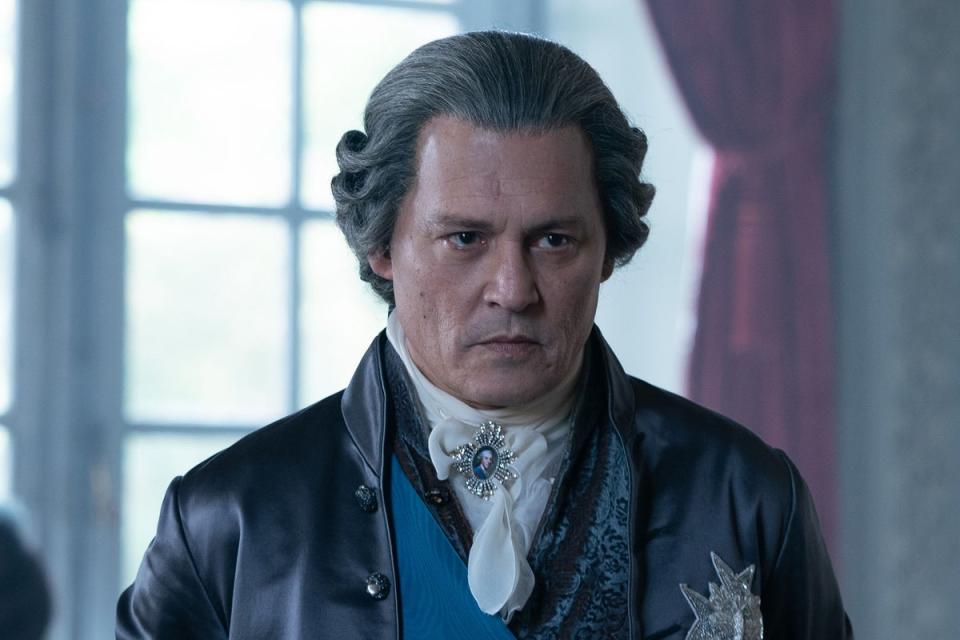Jeanne du Barry review: Johnny Depp’s comeback film is a listless, laughable exercise in self-glorification
If you’d like to know what vanity projects look like over in France, here’s Jeanne du Barry, in which mononymous filmmaker Maïwenn recounts the life of King Louis XV’s chief mistress as an exercise in self-glorification. Jeanne, of course, is played by Maïwenn.
Louis XV is played by Johnny Depp, in a performance so remarkably listless that his casting seems to serve no other purpose than to deliberately stoke controversy. It’s a rebuke to anyone who took pause at Amber Heard’s allegations of domestic abuse against the actor, and the rule of a UK judge that a “great majority of alleged assaults ... have been proved to the civil standard” (a second civil case in the US, in which Depp sued and Heard countersued, ruled in favour of Depp and partially in favour of Heard).
Jeanne du Barry, supposedly, is all about throwing two fingers up to the naysayers (Maïwenn herself was also fined €400 (£342) by a Paris court this year for assaulting a journalist in 2023, over what he claims was his reporting on the sexual assault accusations against her ex-husband, director Luc Besson – Maïwenn said this month that she “didn’t apologise” and that she “doesn’t regret anything”). Jeanne was a lifelong outsider within the French court, the illegitimate daughter of a seamstress who successfully weaponised her beauty in order to enter the kingdom’s most private chambers.
But Maïwenn, who’s been critical of feminism and the #MeToo movement, shows no apparent interest in the relationship between power and sex, instead merely portraying Jeanne as an 18th-century pick-me girl – an au naturel free spirit in a court full of painted harpies. There isn’t a drop of subtlety here. Louis XV’s daughters are outfitted and played as the ugly stepsisters, described as “antipodes of seduction”, despite also being deep in mourning over their mother. Marie Antoinette (Pauline Pollmann), who arrives at court to marry the king’s grandson (Diego Le Fur), is an airhead easily led into mean girl territory.

The message of Jeanne du Barry appears to be, well, some women are born sexy, so what can they do but serve men? Or, as the film’s narrator queasily insists: “What good is innocence if others harbour guilty desires for you?” Certainly, Jeanne was not as interested in policy as her predecessor, Madame de Pompadour. But Maïwenn and her co-writers, Teddy Lussi-Modeste and Nicolas Livecchi, struggle to conceive who she could have been beyond her relationship with the king, which is presented as a great, mutual love, despite the vacuum of chemistry between Depp and Maïwenn.
There are more comical scenes of royal protocol, including the ritualistic morning toilette famously depicted in Sofia Coppola’s Marie Antoinette (whose inclusion of Jeanne, as played by Asia Argento, first inspired Maïwenn). Yet the film doesn’t work as farce, since its closing titles then solemnly bemoan the “adversity” Jeanne would soon face, as if the French Revolution were merely a terrible imposition.
At one point, Jeanne is given a young Bengali boy, a slave named Zamor, as a present by Louis XV. She didn’t grant him his freedom but made him a page, and dressed him in exoticising silk suits. The film presents this as proof of her beneficence, then dares to call Zamor’s later decision to join the revolution an act of betrayal.
The film doesn’t work as an extravagant costume drama, either, since Jürgen Doering’s choices in ahistorical gowns are oddly inexplicable. Partially provided by Chanel, and paired with messy bed hair, they make Jeanne look as if she were hosting a croquet party in the Eighties.
But the emptiness of Jeanne du Barry does, incidentally, have a lot to say about the state of the French film industry. Last year, it was chosen to open the Cannes Film Festival. Also last year, one of the country’s most promising talents, Portrait of a Lady on Fire actor Adèle Haenel, announced her retirement from the film industry, citing France as a “capitalist, patriarchal, racist, sexist world of structural inequality”. What is preserved and what is lost feels especially stark here.
Dir: Maïwenn. Starring: Maïwenn, Johnny Depp, Benjamin Lavernhe, Pierre Richard, Melvil Poupaud, Pascal Greggory. 15, 116 minutes.
‘Jeanne du Barry’ is in cinemas from 19 April, and available on digital release from 20 May


